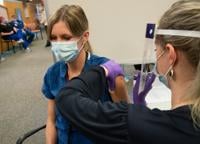MADISON (WKOW) -- A few new COVID-19 subvariants have started to spread quickly across the United States, and doctors are watching closely to see how this affects the number of people who get sick.
UW Health's Dr. Jim Conway said the BA.4 and BA.5 omicron variants were dominant a month ago, but that's not the case now.
"They're basically gone," he said. "They've been replaced."
In that time, the percent of people getting sick from the BQ.1 and BQ.1.1 omicron subvariants has grown.
CDC data shows those two versions of the virus accounted for an estimated 63.5% of infections in Wisconsin, Minnesota, Illinois, Michigan, Indiana and Ohio from December 4 through December 10. That's up from 5.6% of infections in mid-October and 25.7% in mid-November.
"These things change very quickly," Conway said. "It's literally over just a couple of weeks they become the predominant strains."
He said this is causing doctors some trouble because immunity from the original COVID-19 vaccines and from previous infection doesn't seem to prevent infection from the new subvariants.
That trouble is compounded by the fact some tried and true treatments, like monoclonal antibodies, don't seem to work, either.
"We're really losing a lot of the tools in our quiver or in our tool belt that we've used to fight these things and we've used to push them back," Conway said. "The fear is that the vaccines and the other treatments that we have just aren't going to work as well as they have up until now."
Conway said doctors believe the updated, bivalent COVID-19 vaccine booster shots do provide some protection against BQ.1 and BQ.1.1 because the shots were formulated for the omicron variant and these are subvariants of that strain.
However, he said it's not a bad idea for people to start wearing masks again if they're going to be in crowded spaces, particularly as we approach the holidays.
"We do need to kind of double down on a lot of these infection mitigation strategies that we've been using," Conway said. "We showed they work really, really well. We know they're kind of annoying, but, you know, it's the difference between getting sick and then potentially spreading it to your friends and family or staying well and healthy."
Conway said doctors don't yet have enough data on the new subvariants to know why they're spreading this quickly or if they lead to more severe disease.














